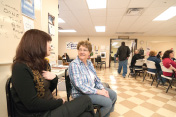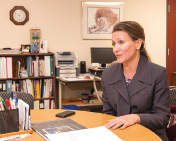Clubhouses in Michigan: Including People with Psychiatric Disabilities
- Esther E. Onaga
- Associate Professor
- Department of Human Development and Family Studies
- College of Social Science

MSU graduate student Eun-Jin Han and Dreams Unlimited Clubhouse director Joyce Raupp at lunch hosted for ICCD reviewers
When we hear the word "clubhouse" most of us envision a party scene, full of fun. While the clubhouses that Esther Onaga works with in Michigan create their fair share of enjoyment, they also have a more serious purpose. Dr. Onaga has, for decades, collaborated with community partners to ensure the societal inclusion of groups that have all too often been marginalized from mainstream society, including those with psychiatric disabilities and children and youth with autism spectrum disorder. Evaluating the Michigan Clubhouse program is her latest endeavor aimed at creating supportive, inclusive communities.
Clubhouse is a community-based, collaborative, psychiatric rehabilitation model, which dates back to 1948, when Fountain House was established in New York City.[1] With the success of Fountain House and subsequent versions of it, Clubhouse soon became a movement within the United States and then globally. Radical for its time and progressive even by today's standards, Clubhouse is a purpose-built, non-residential community for women and men who have a history of psychiatric illness. Rather than being part of a traditional "doctor-patient" medical model for care, Clubhouse members partner with staff as peers, sit on advisory boards, and undertake work that is both productive and satisfying in spite of their psychiatric challenges.

Esther Onaga at Dreams Unlimited Clubhouse, Royal Oak, Michigan
From its early days, Clubhouse has grown into an international community comprising more than 330 clubhouses worldwide serving some 55,000 people annually. The International Center for Clubhouse Development (ICCD), a nonprofit organization based in New York, provides resources and oversees a certification process; ICCD-certified clubhouses are recognized as evidence-based practice by the Substance Abuse and Mental Health Services Administration. Michigan's 44 clubhouses, which involve 18 prepaid inpatient health plan (PIHP) providers, serve some 2,800 "active" members (defined in a 2011 report[2] as those who attended a clubhouse at least once in June 2011). Clubhouses are located in urban, suburban, and rural communities across Michigan. Today there are six ICCD-certified clubhouses in the state and one that is awaiting the results of a review. According to Onaga, these are "Michigan's leaders."
Clubhouse services include employment and vocational supports, education, outreach, advocacy, housing, assistance with accessing health care, substance abuse services, and social support. Providing meaningful tasks that involve a diversity of roles is key to the program's success. While creating supportive, positive environments that provide useful skills and enhance members' sense of personal empowerment and self-esteem is itself a worthy goal, it is also important to ensure that clubhouses are performing effectively on a consistent basis. Onaga and her team of graduate student researchers have been measuring the performance of Michigan clubhouses for the past few years, producing assessment reports in both 2010 and 2011.

"Sherry" developed and leads a volunteer education program for Dreams Unlimited Clubhouse members.
In 2010, in partnership with the Michigan Departmentof Community Health (MDCH) and with input from Clubhouse members and staff, Onaga and her team developed a survey that was completed by approximately 44 clubhouses in Michigan, in both 2010 and 2011. The surveys collected information on a set of performance indicators based on Michigan's Medicaid requirements and a University of Hawai'i survey instrument.
At the Dreams Unlimited Clubhouse, members are encouraged to develop their own programmatic agendas. "Sherry" runs an education program, powered by volunteers, which she developed from scratch. She works with 25-28 students a month. Topics include citizenship, computer skills, reading, sewing, typing, cashbox/making change, and preparation for college work—whatever people want. Sherry noted that no paid staff were involved, "just member helping member. Anybody who wants to learn, we can accommodate. I may not know how to do something, but I know how to find somebody who does."
In June 2011, MDCH distributed reports on the survey results to clubhouse directors and the executive directors of PIHPs and community mental health services programs. The reports described quantitative program and performance indicators of clubhouses in Michigan,and provided information on how these clubhouses were performing; discussion points for each clubhouse regarding areas of improvement; and data comparing 2010-2011 with 2009-2010. The assessment team also provided a set of recommendations, focusing on areas such as employment, education, housing, cost per member, accountability (including more stringent standards for non ICCD accredited clubhouses), and ongoing data collection needs. Onaga described a pilot project, aimed at quality improvement, in which people with a psychiatric diagnosis served as peer reviewers of Michigan clubhouses: "The staff liked doing it, but peer members loved it—all but the writing. They made good observations, had good rapport—I couldn't do that. The work of helping people at the edge is an important part of recovery."

Juliana Harper, program director for Easter Seals, talks about the importance of evaluating outcomes.
At a meeting of the Dreams Unlimited Clubhouse in March 2012, in Royal Oak, Juliana Harper, program director for Easter Seals, noted the importance of the study: "In Michigan, there's not much emphasis on clubhouses and their outcomes," she said. "This evidence-based model reinforces the role of staff. We have some standards but application is variable. The report by Dr. Onaga and her team is a beautiful document; programs can now get a comparison against their peers in the same area." Harper also lauded Joyce Rupp, the Dreams Unlimited Clubhouse director, saying that "Beyond being a leader, she wants to learn and share knowledge. Joyce is amazing" (a view that Onaga shares).
Armed with information from the reports, Clubhouse staff and members and the stakeholder groups that support them can help ensure that this rehabilitation program achieves its goal of assisting people with psychiatric disabilities to recover and to become fully integrated into mainstream society. "People with mental illness have the hardest stigma to overcome," noted Onaga. "Inclusion is not just getting people to change attitudes, but actual status change: your own house, car, friends, and tickets to a football game." Such inclusion is, for Dr. Onaga, what really matters.
- Written by Catherine A. Gibson, University Outreach and Engagement
Sources
- International Center for Clubhouse Development. (2009). ICCD history. Retrieved from iccd.org/history.html.
- Onaga, E., & Han, E.-J. (2011, December 31). Report on the 2011 Michigan Clubhouse survey. Lansing: Michigan Department of Community Health.